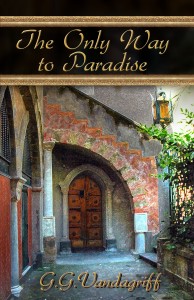GG has long fascinated me. First, there are those initials (which, believe it or not, I forgot to ask about). She writes a range of fiction–from romance to historical (and sometimes both)–but she always chooses an interesting, evocative setting. And, more likely than not, it’s a place she’s visited and spent time getting to know well. Let’s get on with the interview, and be sure to read through to the end because GG’s offering to give away one of her books in either Kindle or Nook format to one of those of you who leave a comment! (I’ll let Random.org decide.)
Me: Tell me about the first story you ever remember writing.
GG: I was in fourth grade. My story, “The Ballerina Who Couldn’t Dance,” (about a doll) won the elementary school contest. I remember how wondrous the process of writing seemed to me as the story came alive in my mind.
Me: You say on your website that you were “wired to be a writer.” How so? And why did you ever get mixed up with finance as a career?
GG: The reason I feel I was “wired” to be a writer is because from a very early age I was seeking and creating alternative realities. I came from a severely dysfunctional family, and this was my escape. Also, writing is in my genes–my great grandfather had his own newspaper and came from a long line of newspaper editors. (Okay, that proves it!) Another factor is my bi-polar disorder which is a very frequent malady among novelists. It causes me to take a more in-depth look at the world and my emotional responses to it. Also, the disorder causes creative tension, which is only resolved by creation itself.
(Ah, so writing heals you in a way.)
As for finance, that was a fluke. I was living in Boston looking for a job after college. I gave my resumé to Harvard and they had me interview for the job of Assistant to the Treasurer! (That must have been some resumé!) I got it. I learned about bonds and investing there. I went on to work at Fidelity Investments, and with that background, after I obtained my master’s degree, I was hired by Continental Bank of Chicago to be the first woman International Banking executive. I put my husband through law school with that job, but hated it intensely! Thereafter, I taught economics in college.
(Liz, if you’re reading this, you might want to consider GG for a future Treasurer on the LDStorymakers board of directors.)
Me: What kinds of things happened during your childhood and adolescence that influence your writing today?
GG: One of the really good things that happened was that my father sent me to England all alone when I was 16 to stay with a client’s family. That visit changed my life. I saw the “greater world” for the first time, made friends with people far older than me, developed a passion for history, and realized that real life could be more exciting than reading.
Also, my aunt, who also struggled with bi-polar disorder, had great faith in me and my childish scribblings. She told me I was destined to be an “authoress,” planting that idea in my mind very early. (Good for her!)
The negative influences of my home caused me to seek safety and escape, driving me to incessant reading and all my earliest writing attempts. Reading the “greats” always pays off for a writer.
Me: In all your travels, which countries have been your most and least favorite and why? (And I’d love a picture or two of you in each, if possible.)
GG: I love Italy the most, because Florence, the seat of the Renaissance, absolutely sparkles with possibilities. When you see the art of Michelangelo, Brunelleschi, Raphael, and all the great artists of the age, it makes you realize that artistic miracles are possible. Something in the air of Florence completed a creative circle inside me. I was able to take my writing to a new level.
 A view of the famous Duomo in Florence, Italy. The air does sparkle, doesn’t it?
A view of the famous Duomo in Florence, Italy. The air does sparkle, doesn’t it?
Living in Austria for six months was a life-changer for me, as well. I was only 20. Learning the history of that nation caused me to concentrate on studying its politics, art, and economics with such dedication, that my studies grew into THE LAST WALTZ, my Whitney Award-winning epic of the First World War and the Interwar Years.
I don’t have any least favorite place. I have found something to love in all the places I’ve visited. (Well said and indicative of a natural traveler.)
Me: How did you come to live in the Ozarks after graduating from Stanford and working as an International Banker in Los Angeles? And how much of an adjustment was it, if any?
GG: Because of our concerns that our children would grow up with the same convoluted values as my family, we wanted to move as far away from L.A. as possible. We made the mistake of visiting the Ozarks in the spring. It was simply breathtaking. We longed for the simplicity of life there. But as anyone who reads PIECES OF PARIS will find out, life was far from simple! We were the targets of bigots the entire 16 years we lived there. It was a huge adjustment for me. However, because I had literally NO distractions (there wasn’t even a bookstore), that is where I learned to write after years of studying and practicing the discipline. All my early novels had their beginnings in the Ozarks. It was also absolutely the right place to raise our children. They had an ideal childhood with the gospel as its center and formed strong, non-materialistic values, as we hoped they would.
Me: Having served a mission in Italy, I get what you say about how Italians seem to be born with a tendency to love unconditionally. How long were you there researching THE ONLY WAY TO PARADISE and how did that characteristic affect your novel?
GG: I visited Florence on three different occasions while I wrote that book. The first time was for two weeks, the second time for four days, both with my photographer husband. The third time was on my own for almost a month. That last time was when I finally realized that the magic thing about Florence for me was the people. I had many unbelievable experiences during that visit, proving to me the “agape” of the Florentines, and I used all of them in my book. The title of the book implies that the only way to paradise is to learn to love with Christlike love (agape).
Me: Let’s have a look at your writing space. Please describe it in the voice of Lady Kate from your novel, THE TAMING OF LADY KATE. (I’d also love a picture.)
GG: This writing space is dreadfully untidy. There are at least six-months-worth of important papers lying on the floor waiting to be filed! This woman must have a very selective brain to be able to create in the midst of such chaos! Even her files are not in alphabetical order. I do need to take her on as a project, I think. How much more productive she could be under my influence. Over her desk she has an interesting assortment of talismans, including a Grecian rag doll of all things. And she is very behind on framing her covers–she lacks the last four books! But I do like the cranberry colored walls, the leaded glass book cases, and of course the view! From this author’s window it is possible to see a lovely valley, beyond which lies a lake and beyond that a range of mountains. If I just organize it a bit, even I might find this an inspiring place to work. Though, of course, I would never be anything as frivolous as a novelist.
(Very well done. Unfortunately, GG was away from her computer–traveling–when she sent these responses and so she couldn’t send an actual photo, but I think we get the picture!)
Me: You say that bi-polar disorder is a common ailment among writers. Why do you think this is so?
GG: It is a documented fact. Psychiatrist Kay Redfield Jamieson has written a book called “Touched by Fire,” about it. I think it is so because sufferers with this ailment go to depths and heights of emotional experience that other people do not. This enables us to draw scenes that are “larger than life.” It also carves deep into our souls, creating a void that must be filled by some kind of higher understanding of life. If this void is not filled, then suicide is inevitable. Because I am lucky enough to have the understanding of the Gospel in my life, it is possible to fill that void with the love of God. Two of my favorite novelists are Dostoyevsky and Tolstoy. Both of them struggled with this problem, and both arrived at the conclusion that the void could only be filled by living a Christ-centered life.
(Actually, from what I’ve read, Dostoyevsky suffered more from temporal lobe epilepsy–a condition I have–but the two conditions may be related, according to scientists.)
Me: Tell us how and why you and your husband (Passive Guy) got involved in independent publishing. And why does he use that moniker?
GG: David uses that moniker for irony. He started his blog and began recording a pastiche of experiences documenting the technological disruption in the publishing industry caused by the e-book and self-publishing. We became convinced that this is the ultimate destiny of the publishing industry, and that we wanted to get in on the action.
I decided to try publishing Regency romances because they sell so well in this format. I have been thrilled at the response. I have been self-published since April of 2012, and during that time my sales have far exceeded my sales as a DB author. However, that is only for e-books, and only for Regencies. My other books are still nowhere near my Regencies in sales. However, they are also doing very well. (I have the rights back to all my DB books except the two most recent.)
Me: Finally, please explain your writing process and tell us what you’re working on now.
GG: I am a pantser (fly by the seat of my pants). I start with character. When I’m really into the head of my characters, they tell the story. However, I am also learning that I must be in the heads of my readers. I need to be smart about what they want to read and what makes a satisfying story for them. I can’t be totally self-indulgent about this process. If I were a famous author, I could write whatever I wanted to write. But while I am still seeking to be more widely read, I need to be conscious during my writing of what readers in today’s world want to read. A lot of my books have too much angst. I think in today’s unsettled world people are looking for happiness. I know that when I am under stress, I read Regencies. The clean ones have strict values, admirable characters, and are driven to the happy ending, which is always marriage. This soothes the soul. And that is why Regencies sell. So now I am writing Regencies.
Specifically, I am 2/3 finished with “Miss Braithwaite’s Secret,” my third Regency, incorporating characters from my first two books. It will be slightly more serious in tone with better developed characters. It will be interesting to see how its sales do in comparison with my lighter fare.
Thanks for the thought-provoking questions!
My pleasure. :D
If you want to know more about GG, check out her website or blog. And if you want to win a free Kindle or Nook copy of THE TAMING OF LADY KATE, THE DUKE’S UNDOING, THE LAST WALTZ, or THE ONLY WAY TO PARADISE (your choice), please leave a comment.
What do you think about the connection between writers and bi-polar or other neurological disorders? Or what do you think about the future of self-publishing?
Next Wednesday, I’m interviewing Gregg Luke, author of medical thrillers.
(If you’re an author and would like to be featured in my “Wednesday Writer” series, just drop me an email at tanyaparkermills(at)mac(dot)com.)
Originally posted 2012-10-03 06:00:13.


